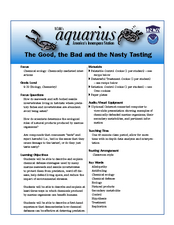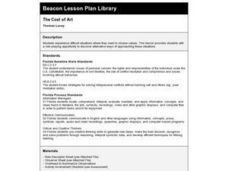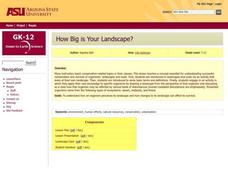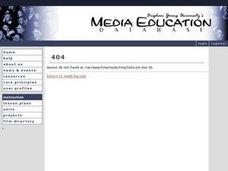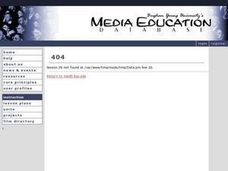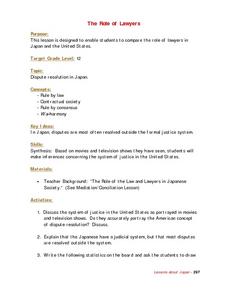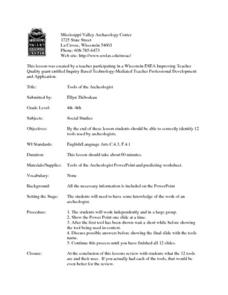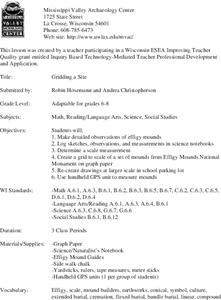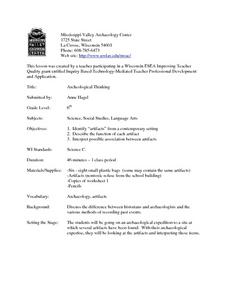Curated OER
BLAST Algorithm
Students explore a series of activities on using BLAST. In this biology lesson, students explain the significance of BLAST in DNA query. They give real world applications of BLAST.
Curated OER
Hear No Evil, See No Evil, Speak No Evil
Second graders explore conflicts that occur in the school setting.
Curated OER
The Friendship Bridge
Students brainstorm example of big problems and small problems. They watch a Powerpoint presentation, were the students role played everyday social problems that they had encountered. Students demonstreate using the Friendship Bridge...
Curated OER
Debate: Whose Land Is It?
Students identify the main factors involved in determining who was able to claim the land of California as their own. They determine the factors of unjustness in the Gold Rush times. Students reflect on what they learned from the debate...
Curated OER
The Good, the Bad and the Nasty Tasting
Students examine the effect of chemicals from marine plants or animals on predator's preferences. In this ecology lesson, students conduct taste tests and collect necessary data. They write their conclusion after analyzing experimental...
Curated OER
The Cost of Art
Fourth graders experience difficult situations where they need to choose values. This instructional activity provides students with a role-playing opportunity to discover alternative ways of approaching these situations.
Curated OER
Talk-About-It
Students follow guidelines to meet with others and discuss individual complaints or small problems.
Curated OER
India and Pakistan: a Simulation of Outcomes
Students become aware of world conflicts and how conflict resolution is used to minimize threats around the world. They analyze a current world conflict and utilize conflict resolution strategies to determine a viable peace initiative.
Curated OER
The Role of International Organizations in Peacekeeping
Eighth graders are given two case studies. They determine if the United Nations should become involved, and if so, in what capacity? students explain their decisions based on a set of criteria determined by the class.
Curated OER
How Big Is Your Landscape?
Students explore how an organism perceives its landscape and how changes to its landscape can effect its survival. Of particular focus is the effect of urbanization and the organisms survival in the cities.
Curated OER
Suffering in Sudan
Students investigate the humanitarian crisis in the Sudan. They examine the make up of the rebel groups involved in the fighting and the attempts to resolve the conflict.
Curated OER
Cultural Representation in "Spellbound" Part 1
Students watch the film "Spellbound". They analyze concepts of how the media represents race. They discuss how the movie depicts race after the film.
Curated OER
Culture Representation in "Spellbound" Part 2
Students watch the film "Spellbound". They examine how the film represents race. They analzye contemporary media to examine how they represent race as well.
Curated OER
The Role of Lawyers
Twelfth graders compare and contrast the role of lawyers in Japan and the United States. After viewing movies and television shows, they make guesses about the justice system in the United States. They answer discussion questions and...
Curated OER
The Concept of Wa II
Twelfth graders are introduced to the concept of wa in the Japanese culture. In groups, they compare and contrast the way disputes are handled in both countries. They are given a case in which they state the facts and the issues involved.
Curated OER
Tools of the Archeologist
Young scholars review the job of an archeologist as a class. While viewing a PowerPoint presentation, they guess the use of the tool before the next slide is shown. They also discuss when the archeologist would use each of the twelve...
Curated OER
Point of View
Students participate in an inkblot test to discuss how what they see is different than their classmates. After viewing various artifacts, they write down what they believe the object is and then they are placed into a group to discuss...
Curated OER
Decomposing Artifacts
Seventh graders participate in an experiment in which they calculate the time of decomposition of different materials. In groups, they fill bags with different materials and cover them in soil. After six months, they create a line graph...
Curated OER
Mapping an Artifact
Young scholars copy a present day artifact onto graph paper. In groups, they decide the scale of the drawing and create the picture using specific graphing points. They are also given photographs in which there are no graphing points and...
Curated OER
Gridding a 2 x 2 Meter Unit
Learners use the internet to examine what happens at an archeological dig site. In groups, they practice measuring a 2x2 meter square unit and gridding it out as an archeologist would do. They review the possible solutions at the end of...
Curated OER
Gridding a Site
Learners make observations of effigy mounds and record them in a notebook. In groups, they must determine the scale of measurement and create their own grid to scale part of the Effigy Mounds National Monument. They also practice using...
Curated OER
2 x 2
Students work together to grid a 2 x 2 meter unit using the formula for the Pythagorean Theorem. After creating the grid, they identify the location of artifacts and create a map of their location. They develop a graph and table of their...
Curated OER
Does This Belong to You?
Fourth graders examine legislation that has been passed to protect the rights and religion of Native Americans. In groups, they discuss their feelings on others taking artifacts from Native American sites and what they do if they find...
Curated OER
Archeological Thinking
Sixth graders review the differences between a historian and archaeolgists. At a recent archaeological dig site, they examine the artifacts and determine their usage. In groups, they are given a bag full of artifacts and write down what...
Other popular searches
- Peer Mediation
- Peer Mediation Scenarios
- Mediation Scenarios
- Teaching Peer Mediation
- Peer Mediation Activities
- Conflict Mediation
- Mediation Skills
- Peer Mediation Role Plays
- Mediation Process
- Peer Counseling: Mediation
- Mediation and Arbitration
- Mediation Lesson Plans






